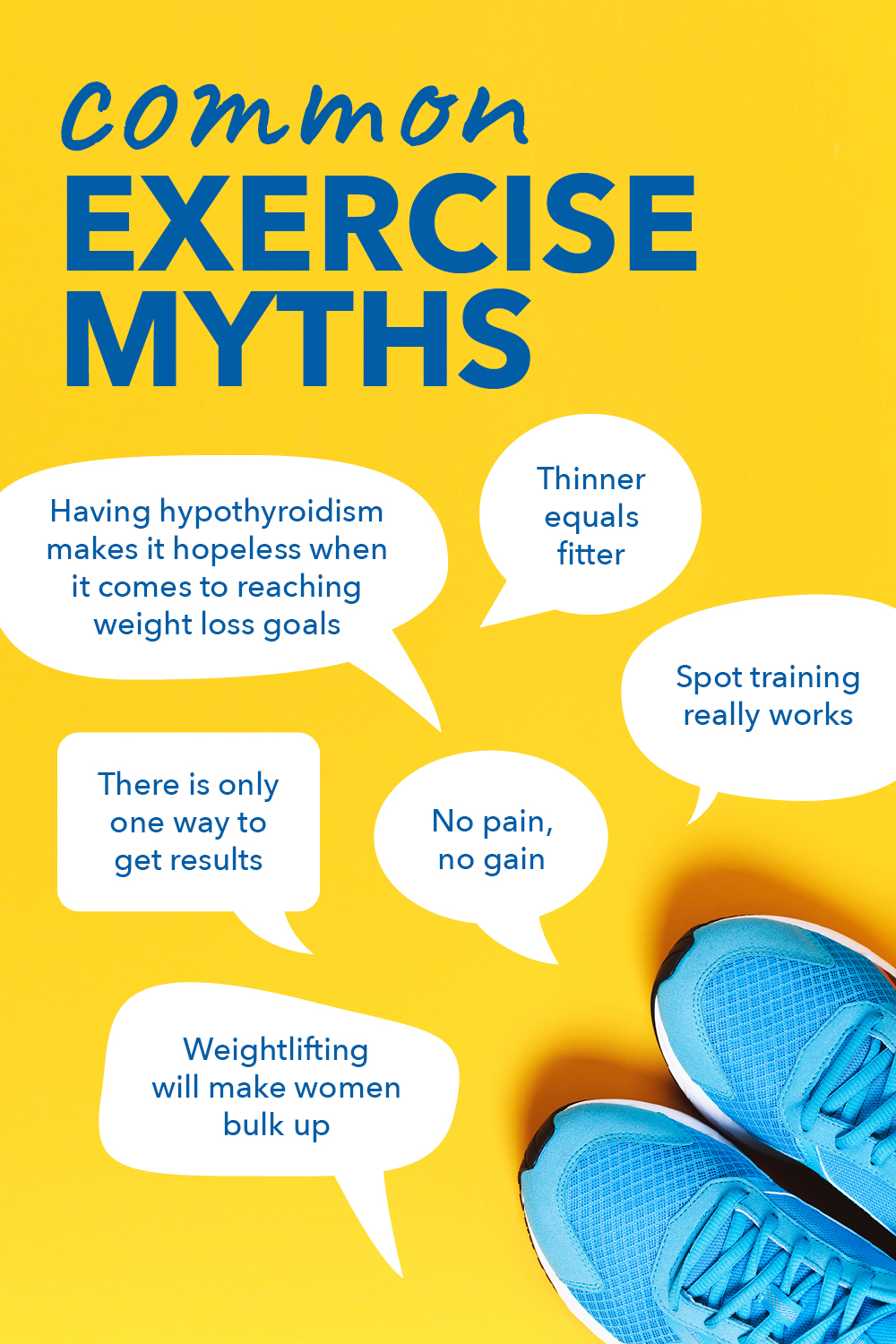Expert Advice

Acella Pharmaceuticals, LLC., is partnering with Angila Berni, M.S., SFGII to bring greater awareness to the importance of thyroid care and education. This post is sponsored by Acella Pharmaceuticals and should not be construed as medical advice. Please talk to your doctor about your individual medical situation.
Disclaimer: The information provided is for educational purposes only and does not substitute professional medical advice. Consult a medical professional or healthcare provider before beginning any exercise, fitness, diet, or nutrition routine.
Exercise can be a daunting thing for many people. If you aren’t in the habit of exercising or are just starting out, you may lack strength or confidence. If you are used to regular exercise, you might feel like you’ll never reach the lofty goals you set for yourself. You may also have heard myths about exercise that make you apprehensive and confused.
If you are managing hypothyroidism, a consistent exercise routine may be impactful in helping you manage your symptoms. This post will debunk some of the common exercise misconceptions so that you can confidently start working to feel better and get stronger.
Myth #1 – Thinner equals Fitter.
False! The shape and size of the body does not indicate the level of health and wellness. The ability of the heart, lungs, muscles, bones, joints, and more to function optimally determines fitness.
Myth #2 – There is only one way to get results.
Some people believe that exercise is the only way to get results, but this just isn’t true. A combination of a balanced diet and exercise are the key to obtaining real-life results. Find exercises you love and bring a friend for an accountability partner.
Myth #3 – Weightlifting will make women bulk up.
Nope, not true ladies. Women do not have enough of the hormone testosterone in their bodies to "bulk up." Lifting weights will build strength, tone the muscles, and increase metabolism. Weightlifting will help burn more calories while doing less.
Myth #4 – No pain, no gain.
Exercising should not be painful. If you experience pain, the body is trying to warn you against something. Mild discomfort, on the other hand, is fine. Always listen to your body, take it slow, and work on quality over quantity with any movement.
Myth #5 – Spot training really works.
False! You cannot spot train one area of the body. An effective exercise program should include the entire body. Functional strength training carries over into real-life situations the best. For example, completing a heavy farmer's carry will help when carrying heavy groceries or luggage. Train the entire body for the greatest results.
Myth #6 – Having hypothyroidism makes it hopeless when it comes to reaching weight loss goals.
While having hypothyroidism makes it more difficult to lose weight, it is possible to reach your goals. Eating a balanced diet, exercising, and creating long-lasting healthy habits is the key to success.
Knowing what to do and when to do it can be overwhelming and confusing. A coach, personal trainer, or nutritionist can help guide you. Even professional athletes have coaches! Why shouldn’t you?

ML-0767
Note that DTE products, including NP Thyroid®, have not been reviewed by the FDA for safety or efficacy.
IMPORTANT RISK INFORMATION, INCLUDING BOXED WARNING & INDICATIONS
Important Risk Information
Drugs with thyroid hormone activity, alone or together with other therapeutic agents, have been used for the treatment of obesity. In euthyroid patients, doses within the range of daily hormonal requirements are ineffective for weight reduction. Larger doses may produce serious or even life-threatening manifestations of toxicity, particularly when given in association with sympathomimetic amines such as those used for their anorectic effects.
- NP Thyroid® is contraindicated in patients with uncorrected adrenal insufficiency, untreated thyrotoxicosis, and hypersensitivity to any component of the product.
- In the elderly and in patients with cardiovascular disease, NP Thyroid® should be used with greater caution than younger patients or those without cardiovascular disease.
- Use of NP Thyroid® in patients with diabetes mellitus or adrenal cortical insufficiency may worsen the intensity of their symptoms.
- The therapy of myxedema coma requires simultaneous administration of glucocorticoids.
- Concomitant use of NP Thyroid® with oral anticoagulants alters the sensitivity of oral anticoagulants. Prothrombin time should be closely monitored in thyroid-treated patients on oral anticoagulants.
- In infants, excessive doses of NP Thyroid® may produce craniosynostosis.
- Partial loss of hair may be experienced by children in the first few months of therapy but is usually transient.
- Adverse reactions associated with NP Thyroid® therapy are primarily those of hyperthyroidism due to therapeutic overdosage.
- Many drugs and some laboratory tests may alter the therapeutic response to NP Thyroid ®. In addition, thyroid hormones and thyroid status have varied effects on the pharmacokinetics and actions of other drugs. Administer at least 4 hours before or after drugs that are known to interfere with absorption. Evaluate the need for dose adjustments when regularly administering within one hour of certain foods that may affect absorption.
- NP Thyroid® should not be discontinued during pregnancy, and hypothyroidism diagnosed during pregnancy should be promptly treated.
Indications
NP Thyroid® (thyroid tablets, USP) is a prescription medicine that is used to treat a condition called hypothyroidism from any cause, except for cases of temporary hypothyroidism, which is usually associated with an inflammation of the thyroid (thyroiditis). It is meant to replace or supplement a hormone that is usually made by your thyroid gland.
NP Thyroid® is also used in the treatment and prevention of normal functioning thyroid goiters, such as thyroid nodules, Hashimoto’s thyroiditis, multinodular goiter, and in the management of thyroid cancer.
Revised
10/2023
You Are About To Leave This Website
By clicking continue, this link will take you to a website to which Alora Pharmaceuticals’ Policies & Terms of Use do not apply.
^Based on prescriptions filled, NP Thyroid® is the #1 Prescribed DTE in the United States. Source: IQVIA National Prescription Audit (NPA) data on file. Acella Pharmaceuticals, LLC.
